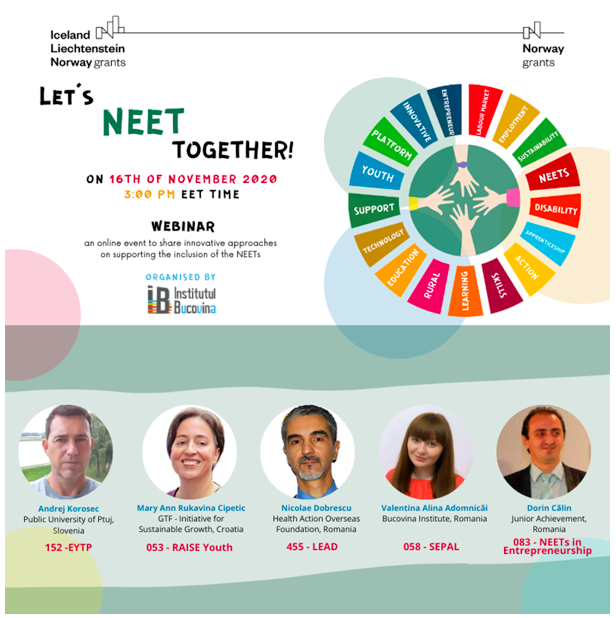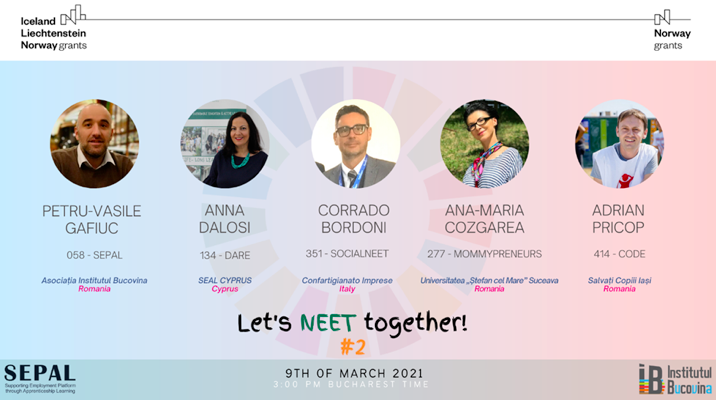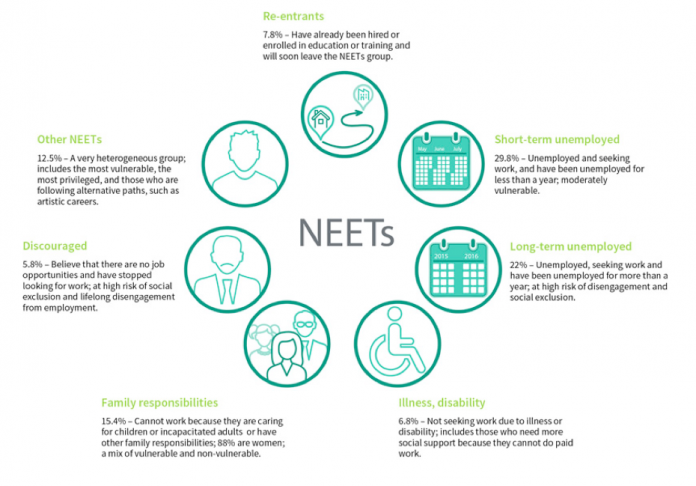Supporting NEETs Employment through sharing innovative approaches at European level through thematic webinars organized by SEPAL.
Unemployment represents a major issue that disproportionately affects young people and especially their life chances. Young people that are part from a vulnerable group, meaning that they come from a disadvantaged background or/and particular ethnic minorities are more likely to be a NEET (‘not in employment, education or training’). In other words, certain groups of young people are far more likely to be employed than others.
Latest data provided by Eurostat, from 2019, shows us that at European level (EU-27), the NEETs’ (15-29 years old) unemployment rate was 12,6%. For some young people, being the NEETs’ category can be a temporary status, while for the others can be a long road of disengagement from actively participating in society, which can be considered a risk of future poor employment outcomes and social exclusion.
The EEA and Norway Grants, through the Fund for Youth Employment, make efforts in order to complete the EU funding regarding the youth employment initiatives, their target group being the young people between 15 and 29 years old, focusing more on those aged between 25 and 29. At the present moment, we can talk about 25 projects developing and identifying innovative solutions on the specific needs of young people coming from vulnerable categories, long-term unemployed, without skills or experience, inactive women caring for children, physical or mental disabled, migrants or ethnic minorities, facing specific barriers in engaging in education and training or accessing the labor market.
Within our project – SEPAL (058 – Supporting Employment Platform through Apprenticeship Learning) we promote a model of NEETs inclusion by facilitating learning on job experience through apprenticeship model and evaluation of competencies on the job. We piloted on the last 2 years our SEPAL innovative approach and in the same time we try to explore what other models are running in Romania in order to support NEETS inclusion on the labor market, in order to validate our methods but also to explore more possibilities. We start for more practical to analyze the other Youth Employment projects active in Romania, and under those special times comes up the idea of online meetings under “Let’s NEET Together” initiated by Bucovina Institute team.
In this regard, we identified the necessity of exchanging best practices between the projects that are currently implemented, beginning a series of online events entitled ”Let’s NEET together!” an online event to share innovative approaches on supporting the inclusion of the NEETs, an initiative started by Bucovina Institute from Suceava, Romania, which is Lead Partner within the SEPAL Project in November 2019.
By now, 9 projects funded by EEA and Norway Grants, through the Fund for Youth Employment presented their innovative approaches, efficient tools and successful stories within the two online events organized on 16th of November 2020 and 9th of March 2021, namely the following: SEPAL (058 – Supporting Employment Platform through Apprenticeship Learning), CODE (414 – Competence Opportunities for Digital Employment), DARE (134 – Day One Alliance for Employment), Mommypreneurs (277), SOCIALNEET (351 – From civil society organizations to social entrepreneurship. Combating youth unemployment and addressing the needs of NEETs), NEETs in Entrepreneurship (083), LEAD (455 – Labor market Employment for young Adults with a Disability), EYTP (152 – Individual Placement and Support for NEETs through Education Youth Technology Platform) and RAISE Youth (053 – Rural Action for Innovative and Sustainable Entrepreneurship for Youth).
Due to the global context concerning the coronavirus pandemic, Bucovina Institute moved most of its activity in the online environment and successfully managed to organize those two webinars at transnational level, with the participation of other 8 colleagues from different projects as speakers and gathering approximatively 150 participants from 16 countries (Romania, Croatia, Poland, Greece, Ukraine, Cyprus, Austria, Spain, Lithuania, Bulgaria, Belgium, Italy, Slovenia, Netherlands, Hungary and Latvia), coming from different fields such as educational, social, communication, psychology or project management/coordination.

The projects presented the use of different approaches or focus on different target groups, emphasizing the following aspects: sharing experiences and views on how NEETs (especially Roma and women) can create their own local jobs in the rural areas, training of the NEETs (low-skilled or long-term unemployed) in small business in order to motivate them to create their own jobs in the local community, coaching and at the job placement of the NEETs using an individual approach based on a two-steps model, establishing Job Labs and a system for validation of non-formal learning, empowering young mothers by developing their entrepreneurship or digital skills and motivating them to start their own business, preparing NEETs for jobs within social enterprises, promoting successful measures for NEETs with diasbilities to increase their access on the labor maket, creating specialised digital training programmes for NEETs at risk of poverty, coming from monoparental families or from rural areas, training of the NEETs through apprenticeship stages using the WISE (Work Intergration Social Enterprises), involving, in the achievement of each project’s objectives, employers, local and national authorities, specialists.
 What is important to mention is that through the” Let’s NEET together!” webinars, we had the chance and the opportunity to identify common elements between projects, such as the individual approaches, the focus on developing NEETs’ skills and competencies, the empowerment of the NEETs to start their own business, trainings regarding the use of digital instruments or the learning at the job experiences in Social Enterprises. In the near future we intend to continue the ”Let’s NEET together!” series by inviting other projects funded by the EEA and Norway Grants, through the Fund for Youth Employment to share with all the participants, their best practices, namely the tools and some successful stories.
What is important to mention is that through the” Let’s NEET together!” webinars, we had the chance and the opportunity to identify common elements between projects, such as the individual approaches, the focus on developing NEETs’ skills and competencies, the empowerment of the NEETs to start their own business, trainings regarding the use of digital instruments or the learning at the job experiences in Social Enterprises. In the near future we intend to continue the ”Let’s NEET together!” series by inviting other projects funded by the EEA and Norway Grants, through the Fund for Youth Employment to share with all the participants, their best practices, namely the tools and some successful stories.
After completing each event organized in the online environment, we usually send an evaluation questionnaire via e-mail to all the participants, and this happened in the case of the two webinars, too. Therefore, we managed to find out what topics were considered the most useful and interesting by our participants, these being listed below:
- The innovation of the projects presented (e.g.: Job Labs, Open Badges, Internships and Apprenticeship Stages);
- The idea of exchanging good and best practices, ideas and experiences between projects;
- The progress of the NEETs in each project;
- The focus on the practical approach more than on the theoretical one;
- Tools and techniques to support the employment of the NEETs from vulnerable groups;
- The use of the social economy in combating youth unemployment;
- Networking and collaboration between local, national and European partners, institutions and organizations;
- New competencies required on the job market at European level;
- Promoting the establishment of a national vocational training fund in which employers direct 2% of income tax (as in Spain);
- The inclusive learning activities, but also the validation and recognition of previous learning.
We are happy to receive appreciations by Funding Operators, Senior Sector Officer FMO, Mrs. Grethe Haugay, mentioned “such events build the bridges between projects for creating learning arena and sharing experience” , and from Mrs. Malgorozata Nowak director within FO Ecorys and JCP ‚ “we very much appreciate this grass roots initiatives to cooperate beyond the borders of the projects” .
Through these events we have the chance to discover that are many similarities between us, promotors of Youth Employment in the matter of approaches (individual approach of NEETs, evaluation of existing competencies, developing entrepreneurial and ICT skills which today are considered basic skills on the labor force market, involving Local Stakeholders as local support services for employment, learning on the job stages or certification of competencies) or developing creative methods for enhancing the most vulnerable youngsters (youngsters with disabilities, roma ethnic minorities, migrants or those with less skills from rural areas).
For the next period we intent to explore more the potential of those 25 projects financed through Youth Employment Program financed by EEA and Norway, by organizing other three more webinars in order to collect the validated methods and tools on supporting NEETs employment. We intend to invite speakers belonging to the partner organizations of the program and not only the lead partners in order to understand the grass roots vision in working directly with young NEETs. As a fallow up mostly of them will be invited to be part of SEPAL Coalition on building EU platform with solutions for youth employment and all the recommendations and legal advices will be collected within an instrument called SEPAL White Book that will be signed by coalition members and sent to the DG Employment and EU Commission. We start the process of preparing this phase together with the European network Social Firms Europe CEFEC and we believe that the Youth Employment should be considered as a top priority for the actual planning of youth pillar within Recovery and Resilience Facility (RRF) but also for the EU 2027 Fund Programs.
Done by Vasile Gafiuc, SEPAL project coordinator and Alina Adomnicai, SEPAL communication expert


